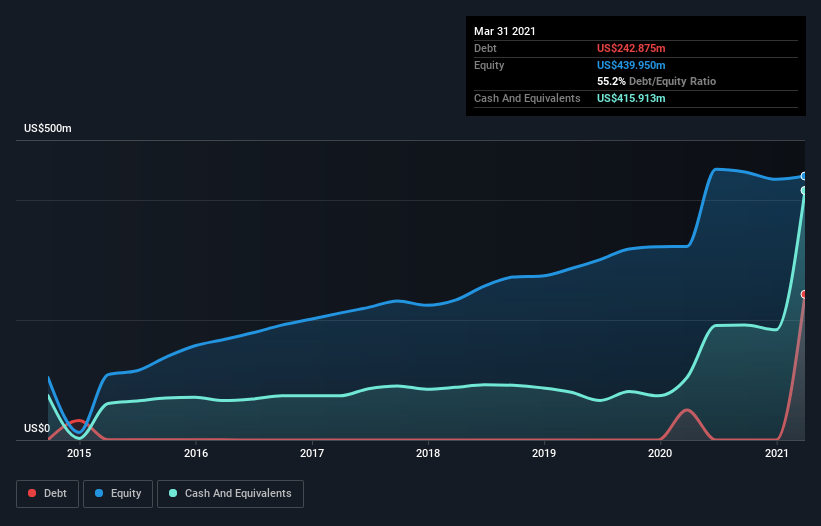
Legendary fund manager Li Lu (who Charlie Munger backed) once said, 'The biggest investment risk is not the volatility of prices, but whether you will suffer a permanent loss of capital.' When we think about how risky a company is, we always like to look at its use of debt, since debt overload can lead to ruin. As with many other companies Shake Shack Inc. (NYSE:SHAK) makes use of debt. But the real question is whether this debt is making the company risky.
When Is Debt A Problem?
Debt and other liabilities become risky for a business when it cannot easily fulfill those obligations, either with free cash flow or by raising capital at an attractive price. If things get really bad, the lenders can take control of the business. However, a more common (but still painful) scenario is that it has to raise new equity capital at a low price, thus permanently diluting shareholders. Of course, plenty of companies use debt to fund growth, without any negative consequences. When we think about a company's use of debt, we first look at cash and debt together.
View our latest analysis for Shake Shack
What Is Shake Shack's Debt?
You can click the graphic below for the historical numbers, but it shows that as of March 2021 Shake Shack had US$242.9m of debt, an increase on US$50.0m, over one year. But it also has US$415.9m in cash to offset that, meaning it has US$173.0m net cash.

How Healthy Is Shake Shack's Balance Sheet?
We can see from the most recent balance sheet that Shake Shack had liabilities of US$118.7m falling due within a year, and liabilities of US$848.9m due beyond that. Offsetting these obligations, it had cash of US$415.9m as well as receivables valued at US$8.84m due within 12 months. So its liabilities outweigh the sum of its cash and (near-term) receivables by US$542.9m.
Since publicly traded Shake Shack shares are worth a total of US$4.37b, it seems unlikely that this level of liabilities would be a major threat. Having said that, it's clear that we should continue to monitor its balance sheet, lest it change for the worse. While it does have liabilities worth noting, Shake Shack also has more cash than debt, so we're pretty confident it can manage its debt safely. The balance sheet is clearly the area to focus on when you are analysing debt. But it is future earnings, more than anything, that will determine Shake Shack's ability to maintain a healthy balance sheet going forward. So if you're focused on the future you can check out this free report showing analyst profit forecasts.
Over 12 months, Shake Shack made a loss at the EBIT level, and saw its revenue drop to US$535m, which is a fall of 11%. That's not what we would hope to see.
So How Risky Is Shake Shack?
We have no doubt that loss making companies are, in general, riskier than profitable ones. And we do note that Shake Shack had an earnings before interest and tax (EBIT) loss, over the last year. Indeed, in that time it burnt through US$33m of cash and made a loss of US$40m. With only US$173.0m on the balance sheet, it would appear that its going to need to raise capital again soon. Summing up, we're a little skeptical of this one, as it seems fairly risky in the absence of free cashflow. There's no doubt that we learn most about debt from the balance sheet. However, not all investment risk resides within the balance sheet - far from it. For example, we've discovered 1 warning sign for Shake Shack that you should be aware of before investing here.
If, after all that, you're more interested in a fast growing company with a rock-solid balance sheet, then check out our list of net cash growth stocks without delay.
If you decide to trade Shake Shack, use the lowest-cost* platform that is rated #1 Overall by Barron’s, Interactive Brokers. Trade stocks, options, futures, forex, bonds and funds on 135 markets, all from a single integrated account. Promoted
New: Manage All Your Stock Portfolios in One Place
We've created the ultimate portfolio companion for stock investors, and it's free.
• Connect an unlimited number of Portfolios and see your total in one currency
• Be alerted to new Warning Signs or Risks via email or mobile
• Track the Fair Value of your stocks
This article by Simply Wall St is general in nature. It does not constitute a recommendation to buy or sell any stock, and does not take account of your objectives, or your financial situation. We aim to bring you long-term focused analysis driven by fundamental data. Note that our analysis may not factor in the latest price-sensitive company announcements or qualitative material. Simply Wall St has no position in any stocks mentioned.
*Interactive Brokers Rated Lowest Cost Broker by StockBrokers.com Annual Online Review 2020
Have feedback on this article? Concerned about the content? Get in touch with us directly. Alternatively, email editorial-team (at) simplywallst.com.
About NYSE:SHAK
Shake Shack
Owns, operates, and licenses Shake Shack restaurants (Shacks) in the United States and internationally.
Reasonable growth potential with adequate balance sheet.
Market Insights
Community Narratives



